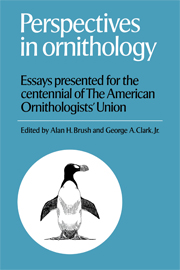 Perspectives in Ornithology
Perspectives in Ornithology Published online by Cambridge University Press: 04 August 2010
One may define biogeography as the geographic arrangement of living organisms, the history of how a particular arrangement is achieved, and an analysis of possible reasons for the arrangement. Biogeography thus overlaps broadly with ecology (as defined by Krebs 1978) and with large sections of systematics, paleontology, and geology. These overlaps are mirrored in a schism between historical biogeography and ecological biogeography, the former grounded in evolutionary systematics and the earth sciences, the latter in ecology. Literatures in the two traditions are largely separate, and Rosen (1978) feels that this schism is inevitable and likely permanent. I predict that the differences between the two approaches will lessen. They are more a function of different foci: long time frames and large geographic scales for historical biogeography and short periods and local geography for ecological biogeography (Simberloff et al. 1981). Furthermore, a complete understanding of current biogeographical patterns requires both approaches, and I feel that the two traditions are beset by the same main problem: frequent absence of falsifiable hypotheses and of statistical tests that can help to choose between competing theories. Ball (1975) suggests that all sciences pass through a descriptive stage (when patterns are noted), a narrative stage (when explanations are proposed for the patterns but are simply coherent narratives), and an analytical stage (in which competing hypotheses are rigorously tested) and that biogeography is on the threshold of the analytical stage.
To save this book to your Kindle, first ensure no-reply@cambridge.org is added to your Approved Personal Document E-mail List under your Personal Document Settings on the Manage Your Content and Devices page of your Amazon account. Then enter the ‘name’ part of your Kindle email address below. Find out more about saving to your Kindle.
Note you can select to save to either the @free.kindle.com or @kindle.com variations. ‘@free.kindle.com’ emails are free but can only be saved to your device when it is connected to wi-fi. ‘@kindle.com’ emails can be delivered even when you are not connected to wi-fi, but note that service fees apply.
Find out more about the Kindle Personal Document Service.
To save content items to your account, please confirm that you agree to abide by our usage policies. If this is the first time you use this feature, you will be asked to authorise Cambridge Core to connect with your account. Find out more about saving content to Dropbox.
To save content items to your account, please confirm that you agree to abide by our usage policies. If this is the first time you use this feature, you will be asked to authorise Cambridge Core to connect with your account. Find out more about saving content to Google Drive.